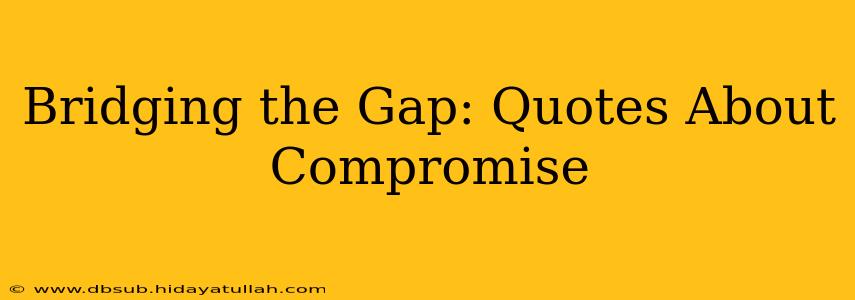Compromise. The very word can evoke mixed feelings. For some, it represents a necessary evil, a weakening of one's convictions. For others, it's the cornerstone of successful relationships, both personal and professional. Regardless of your perspective, the ability to compromise is an essential life skill, a bridge that spans the chasm of differing opinions and builds pathways to collaboration and understanding. This exploration delves into the wisdom of various thinkers and leaders, examining their perspectives on the art of compromise and its role in navigating the complexities of life. We'll explore what compromise truly means, its benefits, and how to approach it effectively.
What is Compromise? A Definition
Before diving into the quotes, let's clarify what we mean by compromise. It's not about surrendering your beliefs entirely or accepting defeat. Instead, it's about finding mutually acceptable solutions that address the needs and concerns of all parties involved. It's a process of negotiation and collaboration, where each individual might have to concede some ground to achieve a common goal. It requires empathy, understanding, and a willingness to see things from another's point of view.
Inspirational Quotes on Compromise: A Diverse Perspective
The following quotes offer diverse insights into the nature and importance of compromise, highlighting its value in both personal and professional contexts:
-
"Compromise is the art of dividing a cake so that everyone believes they have the biggest piece." – Anonymous. This quote cleverly captures the essence of successful compromise: it's about making everyone feel heard and valued, even if it means making concessions.
-
"The only way to do great work is to love what you do. If you haven't found it yet, keep looking. Don't settle." – Steve Jobs. While seemingly contrasting with the theme, Jobs' words highlight the importance of knowing your core values. Compromise doesn't mean sacrificing your passions entirely, but rather finding ways to integrate them with the needs of others.
-
"Compromise makes a peaceful life possible." – Dalai Lama. The Dalai Lama's quote speaks to the profound impact of compromise on building harmonious relationships and fostering peaceful coexistence.
-
"The art of compromise is the art of making concessions, not to one's principles, but to one's tactics." – Unknown. This emphasizes the crucial distinction between compromising on strategy and compromising on core values.
People Also Ask: Addressing Common Questions about Compromise
Here, we address some frequently asked questions related to compromise:
How Can I Compromise Effectively?
Effective compromise involves active listening, empathy, and a willingness to find creative solutions. Start by clearly stating your needs and understanding the other party's perspective. Look for common ground, explore various options, and be prepared to make concessions while protecting your core values.
When is Compromise Not Necessary?
Compromise shouldn't be seen as a universal solution. In situations involving ethical violations or issues of safety and well-being, compromising your principles may be inappropriate or even harmful. It's crucial to discern between situations that require flexibility and those that demand unwavering conviction.
What are the Benefits of Compromise?
The benefits of compromise are numerous, including stronger relationships, improved collaboration, reduced conflict, and enhanced problem-solving abilities. By finding mutually agreeable solutions, parties can work together more effectively and achieve shared goals.
How Do I Know When to Compromise?
The decision of when to compromise depends on the context. Weigh the importance of the issue, the potential impact on relationships, and your personal values. If the potential benefits of finding a solution outweigh the costs of compromising, it may be a wise approach.
Conclusion: The Power of Finding Common Ground
The ability to compromise is not a sign of weakness, but a testament to intelligence, adaptability, and emotional maturity. It’s a skill that fosters understanding, strengthens relationships, and paves the way for collaborative success. While it requires a willingness to give and take, the rewards – from peaceful resolutions to mutually beneficial outcomes – are undeniably worth the effort. By embracing the wisdom offered in these quotes and employing effective compromise strategies, we can build stronger communities and navigate the complexities of life with greater grace and understanding.
